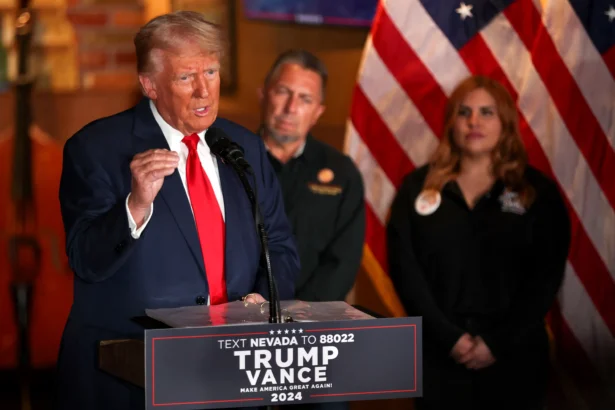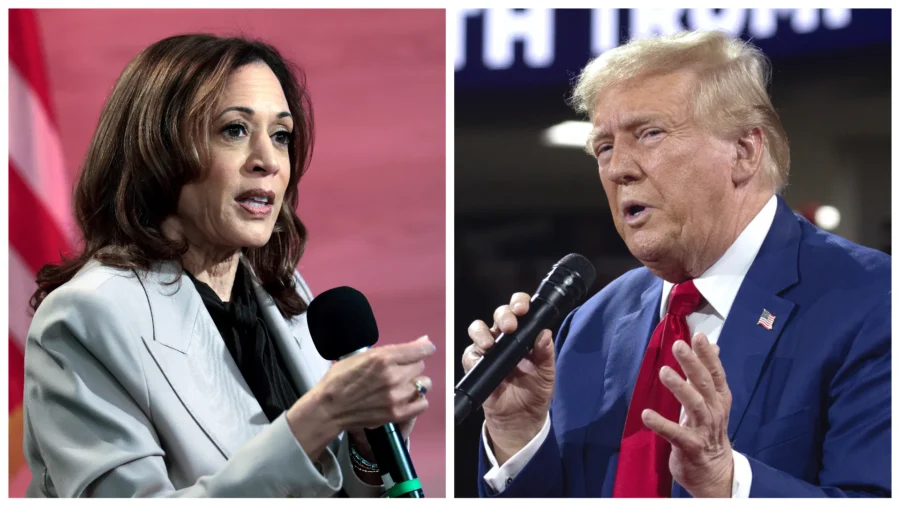If former President Donald Trump impressed the world with his chant “Fight, Fight, Fight” during the assassination attempt, then his domestic tax plan could be similarly described as “Cut, Cut, Cut.”
From tips to Social Security tax, from overtime pay to corporate rates, U.S. presidential candidates Trump and Vice President Kamala Harris have laid out their respective ideas.
Brian Hughes, a senior adviser for the Trump campaign, described the Republican tax plan as the most effective approach to revitalize the U.S. economy.
“President Trump’s plan will rein in wasteful spending, defeat inflation, reduce the burden of interest costs, and ignite economic growth that fuels federal revenue, so we can make our economy great again,” he said.
Here is an overview of both candidates’ pledges on tax.
‘No Tax on Tips’
In June, Trump announced his plan to exclude workers’ tips from federal taxes.
He said he was inspired by a waitress at his Las Vegas hotel and pledged while in Nevada that eliminating taxes on tips would be his “first thing in office.”

Harris echoed this promise two months later at her own Nevada rally, extending the pledge to hospitality and service workers.
Nevada, a key battleground state with six electoral votes, has the country’s highest concentration of tipped workers, with 25.8 waiters per 1,000 jobs. The Trump campaign aims to flip the state, which Biden won in 2020.
Tax Cuts on Social Security
Trump also pledged to exclude elderly citizens from social security tax.
“SENIORS SHOULD NOT PAY TAX ON SOCIAL SECURITY!” he posted on Truth Social in July.
Currently, Social Security recipients pay federal income taxes if their income exceeds $25,000 individually or $32,000 jointly.
Critics, like Brendan Duke from the liberal Center for American Progress (founded by John Podesta, a senior adviser to the Biden administration), warn that Trump’s plan could accelerate Social Security’s insolvency by two years to 2033.
In contrast, Harris co-sponsored a Senate bill to raise Social Security taxes on the wealthy and increase benefits, aligning her stance with President Joe Biden’s approach. However, she has not focused on the issue during her campaign.
Taxes on Overtime
Trump has expressed support for eliminating taxes on overtime pay, stating at a September rally in Tucson, Arizona, “That gives people more incentive to work.” He added that it also makes it “a lot easier for companies to get the people.”
Harris has not commented on whether she would support similar tax cuts on overtime pay.

Corporate Rates
One of Trump’s key economic policies is to boost American production and global competitiveness.
As president, he signed legislation in 2017 reducing the corporate tax rate from 35 percent to 21 percent. Now, as a candidate, he proposes lowering it further to 15 percent, but only for companies producing in the United States.
“We’re putting America first,” Trump said. “This new American industrialism will create millions and millions of jobs.”
Harris, on the other hand, advocates for higher taxes on large corporations and the ultra-wealthy, including a 28 percent corporate tax rate. The additional revenue, she says, would be used to build 3 million homes and provide tax breaks for parents.
SALT Deductions
Ahead of a September rally on Long Island, Trump has suggested he would eliminate the cap on SALT (state and local tax) deductions.
SALT, part of Trump’s 2017 tax cuts, allows taxpayers to deduct state and local taxes from federal income but caps the deduction at $10,000.
The cap was intended to help offset the cost of tax cuts, but high-income individuals in high-tax states feel the most impact. Residents in states like New York, New Jersey, and California are facing larger tax bills, making it a significant campaign issue, especially for New York Republicans in Biden-won districts.
Some Democrats have pushed to lift the cap but many Republicans oppose this. Trump’s former primary rival, Nikki Haley, and others have called for making the 2017 tax cuts permanent—a move reflected in the GOP’s 2024 platform, particularly in provisions like doubling the standard deduction and expanding the Child Tax Credit.
Vice President Harris has not indicated support for preserving Trump-era tax cuts, which expire next year. However, she, like Biden, has vowed not to raise taxes on Americans earning less than $400,000 annually.
The Associated Press contributed to this report.

